There has been a lot of discussion and debate about the right way to store eggs. We wanted to set the record straight once and for all! Here is all the information you need to make sure that you are storing your eggs the right way, keeping them safe to eat, and ensuring they stay fresh until you are ready to eat them!
Keep eggs in their original carton
Sure, those clear acrylic egg holders look chic in your fridge, but the original carton your eggs came in is doing more than just holding them from the store to your door. That egg carton is specifically designed to protect eggs from breakage, harmful light, and strong fridge odors. Eggshells are porous, which means they can easily absorb smells from nearby foods like onions or garlic.
Having the eggs in the carton also keeps the “best by” date front and center, so you don’t have to play the guessing game later regarding the freshness of your eggs.
Why refrigerate eggs in the U.S. but not in Europe
In many parts of the world, like Europe, people store eggs at room temperature. That is because the eggs are not washed before being sold, so the natural bloom on the egg stays intact. In the U.S., however, eggs are washed and sanitized before hitting store shelves, which removes that protective layer. That means American eggs must be refrigerated to prevent bacterial contamination. So, unless you’re getting farm-fresh, unwashed eggs, always store them in the fridge.
OK, but which part of the refrigerator
Do you know that the egg tray is in your fridge door? Ignore it. That spot might seem convenient, but it’s actually one of the warmest parts of your refrigerator because of how often the door is opened and closed. Constant temperature changes aren’t great for eggs. Keep your fresh eggs in the main body of the fridge, ideally on a middle or lower shelf toward the back, where the temperature stays consistently cool. This small shift can significantly extend the shelf life of your eggs.
Eggs stay freshest when stored below 40°F (4°C). Many fridges don’t display their internal temperature, so it can be a smart idea to use a separate fridge thermometer. If your fridge is too warm, eggs will spoil faster. If they are too cold, they might freeze, which is not ideal unless you plan for it. Keeping a consistent, cool temperature is one of the most important steps in keeping your eggs safe and delicious.
Position eggs with the pointed end down
Yes, the direction of your eggs actually matters! Storing eggs with the pointed end down helps keep the yolk centered inside the egg, which not only looks better when you crack it open but also helps the egg stay fresher longer. The rounded end of the egg contains the air cell, so keeping that part facing up minimizes movement and helps preserve the egg’s internal quality. This is a tiny tweak but a surprisingly effective one.
Don’t wash eggs before storing
If your eggs look a little dusty or speckled, you need to resist the urge to rinse them off before putting them in the fridge. Eggs have a natural protective layer called the bloom or cuticle, which keeps out bacteria and helps maintain freshness. Washing eggs actually removes this barrier, leaving them more vulnerable to spoilage and contamination. If you must wash eggs, do it right before you’re ready to use them and not before storage. Most eggs in the U.S. are already washed before being sold, anyway!
Use the float test to check freshness
Are you wondering if your fresh eggs are still, well, fresh? Try the simple float test. Fill a bowl with cold water and gently place your egg inside. If it sinks to the bottom and lies flat on its side, it’s fresh. If it stands upright, it is still safe to eat but should be used soon. If it floats, it must be thrown away and is no longer safe. This works because, over time, air seeps into the egg through the shell, increasing its buoyancy. It is a quick and easy freshness check that you can do anytime.
Freeze eggs for long-term storage
Yes, you can freeze eggs! If you bought too many on sale or have some nearing their expiration date, freezing is a great way to avoid waste. Eggs should not be frozen in their shell; instead, you should crack them into a bowl, beat them until blended, and pour them into silicone molds or an ice cube tray. Once frozen, transfer your frozen egg cubes to a labeled freezer-safe bag. You can also freeze yolks and whites separately. When you are ready to use them, thaw the eggs you need overnight in the fridge. Frozen eggs are perfect for scrambled eggs or casseroles.
Pro tip for baking with eggs: temperature matters
For baking, use room-temperature eggs. They help create smoother, more even batters and better texture in your baked goods. They mix more easily with other ingredients, especially butter and sugar, which leads to better emulsification and more stable batters. This results in fluffier cakes, more tender cookies, and evenly baked pastries. Cold eggs can cause batter to curdle or seize, so letting them sit out for about 30 minutes makes a big difference in the final result.
Don’t return used eggshells to the carton
It might seem convenient to drop a used shell back into the carton while cooking, but this is a big food safety no-no. Eggshells can carry bacteria like salmonella, and reintroducing them to the carton can contaminate the rest of the eggs. Once an eggshell is cracked, it should go straight into the compost bin or trash. Keep your egg carton clean, and your egg will be safer.
Be cautious with alternative preservation methods
There are many viral “hacks” and old-school techniques for preserving eggs, like water glassing or storing them in mineral oil. While these methods can technically work, they are not always food-safe by today’s standards, especially in modern kitchens that already have access to refrigeration. If you are not fully confident in the method (or its safety), stick to refrigeration or freezing, which are both perfect for storing eggs. When it comes to eggs, it’s better to be safe than sorry.
Use older eggs for hard-boiling
Are you planning to make deviled eggs or maybe a nice egg salad? The best thing to do is to use eggs that are closer to their expiration date. Slightly older eggs peel more easily when boiled, thanks to the loosening of the membrane inside the shell. Super fresh eggs might taste great scrambled, but they will give you a headache when it is time to peel them. For perfect peelers, let your eggs sit in the fridge for at least a week before boiling.
The post You are Probably Storing Your Eggs Wrong, Here is the Right Way appeared first on .




